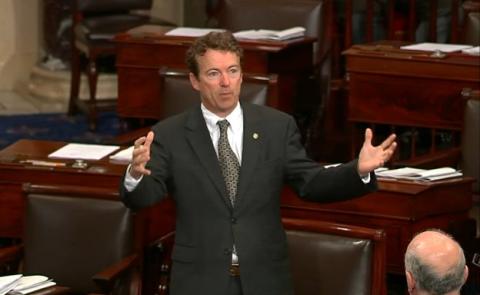https://www.youtube.com/watch?v=H8qMfoYsZcc
On Monday, Senator Rand Paul (R-Ky.) took to Twitter to tell his 1.5 million followers that he's not happy with the tax reform plan published last week by the Trump Administration in partnership with congressional GOP leaders.
The Kentucky Senator's criticism was prompted by a Tax Policy Center report which determined that many middle class taxpayers would see their taxes go up under the Republicans' plan:
https://twitter.com/RandPaul/status/914928161498046464
The abstract of the TPC report says:
"The Tax Policy Center has produced preliminary estimates of the potential impact of proposals included in the 'Unified Framework for Fixing Our Broken Tax Code.' We find they would reduce federal revenue by $2.4 trillion over ten years and $ 3.2 trillion over the second decade (not including any dynamic feedback). In 2018, all income groups would see their average taxes fall, but some taxpayers in each group would face tax increases. Those with the very highest incomes would receive the biggest tax cuts. The tax cuts are smaller as a percentage of income in 2027,and taxpayers in the 80th to 95th income percentiles would, on average, experience a tax increase."
The chairmen of the tax-writing committees in Congress released a statement rejecting the conclusions of the TPC as biased and misleading. House Ways and Means Committee Chairman Kevin Brady (R-Texas) said:
"This so-called study is misleading, unfounded, and biased. TPC makes a variety of overreaching and unrealistic assumptions about policy decisions Members of Congress still have to make as we draft pro-growth tax legislation."
The framework, which sets the overall structure for tax reform as the legislation is written, would streamline the number of deductions while giving a more generous standard deduction, and reduce the number of federal income tax brackets from seven to three at tax rates of 12 percent, 25 percent, and 35 percent, with the possibility of a fourth tax bracket at the very highest end of income earners.
Rand Paul published an editorial on Breitbart Wednesday with more extended remarks about his opposition to the current GOP tax reform framework:
"Unfortunately, though presented as a tax cut for all, the first draft of the GOP tax reform plan wasn’t about how much to cut from everyone; rather, it was who are the winners, and who are the losers.
The plan lowered the top rate, which is great. It lowered corporate taxes, which is necessary for job growth. It lowered taxes on the lowest income people, as well. I’m good with all of that.
However, somewhere in the authors’ efforts to cut taxes for our highest and lowest earners, the middle class was seemingly left to bear the burden. The problem is, after lowering those rates, they decided the rest of the plan should be “revenue neutral.”
If you’ve already cut taxes for the rich and lower incomes, how do you make up the difference to account for those cuts? By raising taxes on those who are left – the middle class."
Paul’s own tax reform plan, called "The Flat and Fair Tax," would eliminate all tax brackets and tax all income at the same rate of 14.5 percent. That includes wages and salaries, capital gains, dividends, interest, and rents.
A Tax Foundation analysis of the Flat and Fair Tax estimates Paul's plan would cut $1.8 trillion of federal revenue from taxes before considering dynamic feedback due to the economic effects of the plan, but raise $737 billion in federal revenue by stimulating economic growth.
